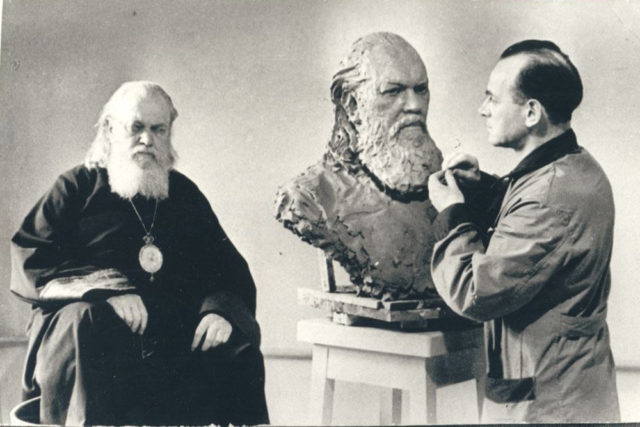
Among the “saints” currently promoted within world orthodoxy, there is
Luke of Crimea, also called Luke of Simferopol (1877-1961). He is now very popular in Russia but also in Greece. However, True Orthodox in Russia do not regard him as a saint, and they are right.
The first reason would be enough: this person was member of the Moscow Patriarchate that has no legitimacy, as we explained previously in this article in French. The Moscow Patriarchate has his origin in the usurpation of the position of locum tenens by Metropolitan Sergius (Stragorodsky) that could not do so since he was not the most senior bishop. Consequently, his organisation, that later became the Moscow Patriarchate was since its birth a parasynagogue. Later, came sergianism and ecumenism.
Moreover, Luke of Crimea persecuted true Orthodox Christians belonging to catacomb churches, that denied any legitimacy to the “Moscow Patriarchate”. Such facts are very well-known. They can be found in Luke’s official biography published in 2006 in Russia:
Author: Marushak, Vasiliy, Archdeacon
Title: Saint-Surgeon: the Life of Archbishop Luka (Voyno-Yasenetskogo).
ISBN: 5-89101-162-Х
Year : 2006
In Russian,
Святитель-хирург: житие архиепископа Луки (Войно-Ясенецкого)
Марущак, Василий, протодиакон
The book was published with the blessing of the former “patriarch” Alexis II as indicated in the first pages. This edition is no longer available but since then, the book was published again. It can be found in libraries and online at this link.
The events we’re talking about occurred in 1948 and are told at page 225. A former Soviet civil servant gives his testimony. Here is the translation; the original Russian text is also given at the end of this article.
Page: 225
1948
Then Luka told me that in one of the settlements of the Bakhchysarai district lives monk Hippolytus (Veryutin), a former Josephite [9], who does not recognize him as either an archbishop or a patriarch, and who goes through the villages performing various kinds of religious rites, and he asked me to take measures to prevent these rites.
In three or four days monk Hippolytus (Veryutin) was summoned by me. He was an elderly man of 80 years living with a farm family in the Bakhchysarai district. During the German occupation he was a priest in the village of Bazarchik, which is now a Postal village of the Bakhchysarai district.
Veryutin denied having done any sort of rituals. Just the same, he was admonished by me: not having the appropriate registration documents, he couldn’t perform any rituals or ceremonies. After this there were no reports of him performing rituals.
[9] Josephites – followers of Metropolitan Joseph of Leningrad (Petrov), shot in 1937, stood in opposition to the Deputy Acting Patriarch Sergius (Stragorodsky).From this extract, we can conclude without any doubt that:
- Luke of Crimea was a persecutor of the catacomb church
- The catacomb church and the “Moscow Patriarchate” were not a unique church, as Moscow Patriarchate followers are now claiming. This example shows how the Moscow Patriarchate tried to eradicate the catacomb church
But a major interrogation is mandatory. How is it possible to regard Luke of Crimea as a saint whereas he made a denunciation that could have had very terrible consequences for the victim, like death penalty, labour camp, and prison. Luke of Crimea for sure could not ignore such consequences.
And finally, how many similar denunciations did he make and what happened to the victims?
Below, the Russian text from the book (page 225)
1948
Затем Лука мне заявил, что в одном из населенных пунктов Бахчисарайского района проживает
иеромонах Ипполит (Верютин), бывший иосифлянин [9], не признающий ни его, как архиепископа, ни Патриарха, который ходит по деревням и совершает различного рода требы, просил меня принять меры, запрещающие ему совершать требы.
Дня через три-четыре иеромонах Ипполит Верютин мною был вызван. Старик лет 80, проживающий в семье одного колхозника в Бахчисарайском районе. В период немецкой оккупации был священником в селе Базарчик – теперь село Почтовое Бахчисарайского р-на.
Верютин отрицал совершение им каких-либо треб. Все же он мною был предупрежден: как не имеющий соответствующих регистрационных документов, не может совершать никаких треб и обрядов. После этого каких-либо сообщений о том, чтобы он совершал требы, не поступало.
[9]. Иосифляне — последователи митрополита Ленинградского Иосифа (Петровых), расстрелянного в 1937 году, стоявшего в оппозиции к Заместителю патриаршего Местоблюстителя Сергию (Страгородскому)


